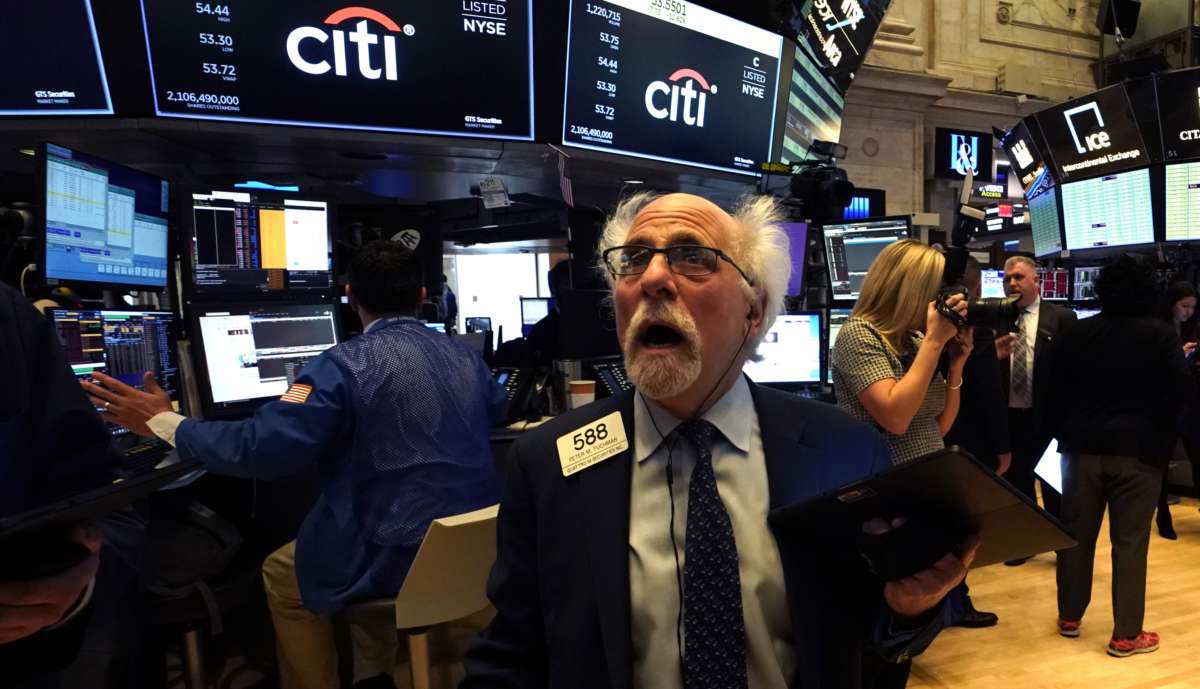Fears of a financial meltdown at least on the scale of the 2008 crisis intensified Monday as global markets were gripped by panic resulting from the spread of the coronavirus across the globe and the ensuing oil price war launched by Saudi Arabia over the weekend.
“The fear today is about a global recession,” said Thomas Hayes, chairman of management firm Great Hill Capital, as markets headed for their worst day since the 2008 crash.
As The Washington Post reported Monday morning: “U.S. futures pointed to heavy losses on Wall Street on Monday. Overseas, London’s FTSE 100 fell more than 8 percent to its lowest in three years; Japan’s Nikkei index slumped more than 5 percent and Australia’s benchmark shed more than 7 percent. Oil prices suffered the sharpest plunge since the 1991 Gulf War, while 10-year U.S. bond yields dropped to a record low as investors sought safety.”
While some urged caution in interpreting the meaning of daily market fluctuations, analysts said there is reason to fear that destructive economic crisis is on the horizon. Chris Weston, head of research at the Melbourne-based web trading platform Pepperstone, told The Guardian that “there is genuine panic” in the market, noting that he hasn’t “seen anything like this for years.”
Escalating market turbulence and warnings of a worldwide economic fallout came as the human toll of the coronavirus, officially known as COVID-19, continued to grow. In the United States, the number of recorded cases surpassed 500 across 34 states and deaths rose to 22 as the Trump administration’s lack of preparedness was on full display Sunday morning.
Asked about the White House’s plan for the 3,500 passengers and crew members aboard the Grand Princess cruise ship—which is set to dock Monday at the Port of Oakland after 21 people on the vessel tested positive for COVID-19—U.S. Housing and Urban Development Secretary Ben Carson insisted that “the plan will be in place.”
Pressed to elaborate, Carson admitted the plan “hasn’t been fully formulated.”
STEPHANOPOULOS: The Grand Princess is docking tomorrow. What’s the plan for the 3,500 people on board?
BEN CARSON: They’re coming up with one
S: It docks tomorrow
C: The plan will be in place
S: Shouldn’t you be able to say what it is?
C: It hasn’t been fully formulated pic.twitter.com/J717Q7q0DG
— Aaron Rupar (@atrupar) March 8, 2020
U.S. President Donald Trump, for his part, told reporters Friday that he would prefer that the passengers remain aboard the Grand Princess because he doesn’t want “to have the numbers double because of one ship,” referring to the number of known coronaviruses cases in the United States.
“This is 25th Amendment stuff,” tweeted Jamil Smith, senior writer for Rolling Stone. “Trump won’t let people infected off of a cruise ship and into quarantine because he likes ‘the numbers being where they are.’ He’d rather keep the numbers down than help these folks. This is literally the worst person to be in charge in this moment.”
Trump’s remarks came just hours after the president falsely claimed that his administration “stopped” the spread of coronavirus in the U.S.
“I like the numbers being where they are. I don’t need to have the numbers double because of one ship” — Trump explains that he doesn’t want to let people off the Grand Princess cruise ship because he doesn’t want the number of coronavirus cases in the country to go up pic.twitter.com/ELhZDjiZW9
— Aaron Rupar (@atrupar) March 6, 2020
Meanwhile, Italy on Sunday ordered what The New York Times described as “an unprecedented peacetime lockdown of its wealthiest region,” restricting movement for as much as a quarter of the country’s population as the country struggled to contain the coronavirus outbreak.
“The Italian outbreak—the worst outside Asia—has inflicted serious damage on one of Europe’s most fragile economies and prompted the closing of Italy’s schools,” the Times reported. “The country’s cases nearly tripled from about 2,500 infections on Wednesday to more than 7,375 on Sunday. Deaths rose to 366.”
Our most important fundraising appeal of the year
December is the most critical time of year for Truthout, because our nonprofit news is funded almost entirely by individual donations from readers like you. So before you navigate away, we ask that you take just a second to support Truthout with a tax-deductible donation.
This year is a little different. We are up against a far-reaching, wide-scale attack on press freedom coming from the Trump administration. 2025 was a year of frightening censorship, news industry corporate consolidation, and worsening financial conditions for progressive nonprofits across the board.
We can only resist Trump’s agenda by cultivating a strong base of support. The right-wing mediasphere is funded comfortably by billionaire owners and venture capitalist philanthropists. At Truthout, we have you.
We’ve set an ambitious target for our year-end campaign — a goal of $112,000 to keep up our fight against authoritarianism in 2026. Please take a meaningful action in this fight: make a one-time or monthly donation to Truthout before December 31. If you have the means, please dig deep.
